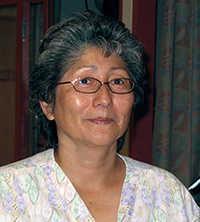Why did you choose your specific health professional career?
I chose this line of work because I felt a great need to help people. I am a people person and it just felt right for me to be a nurse. I also worked as a nursing assistant in the early 1980’s. I tried other areas but I was always drawn back to nursing. Nursing is a challenging field but I enjoy it. The duties often vary and there is always something different each day.
Describe any obstacles or barriers to success that you encountered along your health professional career path. How did you overcome them?
There were many obstacles that I encountered early on in my education. I had to quit my full-time job to pursue a career in nursing. Making this change in my career was a difficult decision because my previous job had helped support my family financially. I was also an older student and struggled with the idea that I should have already settled down with a career by now. During my first semester in school, I also lost my father who was my biggest support.
What do you do in your current job?
I supervise the nursing staff in the Emergency Room (ER) to ensure that there is proper coverage and implement changes to improve the call and flow in the ER. I also make sure the nursing staff is competent in knowledge and skill. If they need improvement, I work with getting them up to par. I also help keep our policies up to date and staff morale upbeat.
What advice do you have for American Indian/Alaska Native students who are interested in health careers?
Take the time to volunteer in the areas you are interested in. Also, find a mentor who can support and guide you in finding a career choice. In addition, look at different schools and find one that will fit your needs and don’t be afraid to ask questions.
What would you like to see for your tribe’s future?
I would like to see a full-fledged hospital with an Intensive Care Unit (ICU), a surgery department, and a birthing center that can handle high-risk Obstetric (OB) patients. I would also like to see more Native Americans in the health professions serving their own communities and taking pride in the quality of care provided.
Do you practice traditional medicine? If you do, then how does traditional medicine interact with conventional medicine?
No, but I respect it and factor this in with Western Medicine. I educate the non-native staff in ways they can understand and assist patients in incorporating traditional medicine into patient care, if requested.


